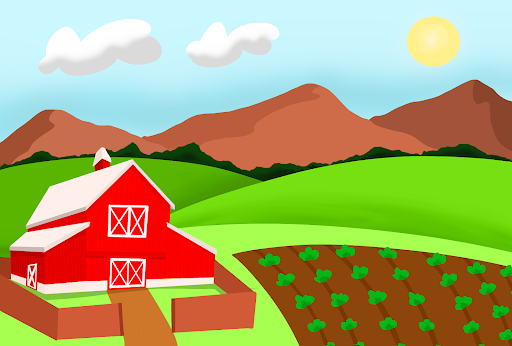Farming

For a long time, humans had lived as hunter-gatherers. They’d go out into the wild and hunt for animals. They’d also roam around to gather fruits and other forms of vegetation. 12000 years ago, humans discovered the art of framing. According to theories, communities in a region known as the fertile Crescent discovered farming but stayed isolated from each other and the rest of the world. Later, farmers, along with their farming know-how, began to migrate to different locations. Some went to Africa, others to South Asia, and then to Europe as well. Due to farming, humans had no reason to hunt or travel around. So they began to settle down, which led to the beginning of civilization. The discovery of farming was a major point in history. It greatly changed human lives and led to the discovery of many other things that make up the modern world.
For so long, humans survived. They lived as scavengers at first, taking all they could from animal remains left over by predators. Then they were hunters, roaming around and gathering food from the wild. They managed to create the most basic tools out of stone and even discovered the wonders of using fire.
And yet, all they could do was survive. Of course, this all changed once Farming came into being.

Entitled the ‘Neolithic Revolution’, the discovery brought about a huge change in human lives. Hunters turned to farmers, and humans began settling down, building towns and cities, basically giving birth to civilization in the process. But that’s not the point here.
The birth of farming was a major point in human history, and we all know that. But have you ever wondered how exactly did farming come into being?
It is widely believed that people began farming about 12,000 years ago, emerging a few places across the globe. The first farmers, though, were said to have been from the Fertile Crescent, a region in the Middle East including modern-day Iraq, Jordan, Palestine, Syria, Turkey and western Iran.
Back in the 1990s, scientists presumed that farming in the Fertile Crescent first began in parts of Jordan and Israel, a region known as the Southern Levant. For a long time, it was thought that farming was started by one group and had spread from there.
Later studies, though, gave us a different idea. Research showed that, rather than one, multiple groups in the Fertile Crescent had begun farming at around the same time. It is thought that these groups stayed completely isolated from each other for a few thousand years. According to Dr. Zeder, there is a possibility that these groups of people had discovered farming independently.
On the other hand, Harvard archaeologist Ofer Bar-Yosef believes farming was only discovered once and had spread from there. He says that, rather than in the southern Levant, evidence of the first farmers was found in northern Syria and Southern Turkey.
As aforementioned, farmers first appeared in the Fertile crescent and stayed there for quite a while. So how do you think farming spread from there?
At the eastern area of the Fertile Crescent, lying within the borders of Iran and Iraq is the Zagros Mountains. Scientists analysed the DNA of skeletons of early farmers found in the area, comparing it to those of the other end, modern-day Turkey. The results were as different as night and day.
Studies show that the Early farmers of Turkey migrated west across the country, crossing the Bosporus(The strait of Istanbul) and into Europe, introducing farming there. Due to this, it was assumed that the DNA of European farmers could be traced back all the way to the Eastern Fertile Crescent. That, however, wasn’t the case.
Rather, evidence shows that it’s possible those farmers from Zagros travelled east, spreading farming in South Asian regions. Furthermore, It’s believed that the farmers of Southern Levant migrated to Africa. This makes it clear that different regions of the Fertile Crescent migrated in different directions.
Now, we’ve already looked into where farming was birthed and how. We’re now left with what’s probably the most important question, why did people turn to farming?
The birth of agriculture seemed to have coincided with the end of the last Ice age, and sudden climate change may have led the land to become more suitable for growing certain crops. Under the pressure of growing populations and the lack of food, humans may have turned to something different for the sake of survival, and they may have just stumbled upon the art of farming.
Of course, this is only a theory.
We all know what farming is, but we’ve never really thought about how it came to be. And, to be honest, I doubt we would’ve expected much.
Despite that, the birth of farming has an incredible story. A history so deep, it would leave you in awe, and we've barely just scratched the surface here.
Farming has come a long way, and it changed a lot during its years. Its birth was a huge turning point in history and the very lives of humans.
References
Blakemore, E. (2019, April 5). The Neolithic Revolution—facts and information. National Geographic.
https://www.nationalgeographic.com/culture/article/neolithic-agricultural-revolution Chatterjee, R. (2016, July 15). Where Did Agriculture Begin? Oh Boy, It's Complicated. NPR.
https://www.npr.org/sections/thesalt/2016/07/15/485722228/where-did-agriculture-begin-oh-boy-its-complicated
Hancock, J. (2022, February 7). Dynamics of the Neolithic Revolution. World History Encyclopedia. Retrieved February 25, 2022, from
https://www.worldhistory.org/article/1937/dynamics-of-the-neolithic-revolution/
Madden, R. (2019, August 19). The Development of Agriculture. National Geographic Society.
https://www.nationalgeographic.org/article/development-agriculture/11th-grade/ Zimmer, C. (2016, October 17). How the First Farmers Changed History. The
New York Times. https://www.nytimes.com/2016/10/18/science/ancient-farmers-archaeology-dna.html
Author biography
Mariyam Eshal Munawwar is a 15 year old living in the Maldives. She loves learning new things and has a great interest in maths and science. Some of her goals are to learn a new language and to teach herself coding. In her spare time, she likes reading books (mystery novels, to be specific), listening to music and podcasts (particularly true crime), and watching shows on Netflix. Her dream is to get into a good university, particularly in the UK, and study forensic science.

Cite this article as:
Mariyam Eshal Munawwar, Farming, theCircle Composition, Volume 2, (2022). https://thecirclecomposition.org/farming-2/
